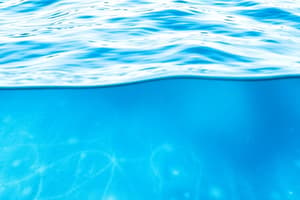Podcast
Questions and Answers
What is salinity in the context of oceanography?
What is salinity in the context of oceanography?
- The concentration of salts in seawater (correct)
- The temperature of seawater
- The measure of dissolved gases in seawater
- The color variation of ocean water
Which of the following is a primary source of ocean salinity?
Which of the following is a primary source of ocean salinity?
- Melting icebergs
- The evaporation of seawater (correct)
- River water influx
- Oceanic volcanic activity
How does surface salinity typically vary with latitude?
How does surface salinity typically vary with latitude?
- It decreases towards the equator from the poles
- It remains constant regardless of latitude
- It increases towards the poles from the equator
- It is highest at the equator and lowest at the poles (correct)
What is the relationship between surface water temperature and depth?
What is the relationship between surface water temperature and depth?
Density in ocean water is influenced by which of the following factors?
Density in ocean water is influenced by which of the following factors?
Flashcards are hidden until you start studying
Study Notes
Salinity
- Salinity is a measure of the amount of dissolved salts in a body of water.
- Salinity is typically measured in parts per thousand (ppt)
Sources of Ocean Salinity
- Weathering and erosion of rocks: Rocks contain dissolved salts that are carried into the ocean by rivers and streams.
- Hydrothermal vents: Volcanic activity releases dissolved salts into the ocean.
- Atmospheric deposition: Wind carries salt spray and other dissolved substances from the ocean into the atmosphere, where they can be deposited back into the ocean.
Variation in Salinity with Latitude
- High salinity: occurs in subtropical regions due to high evaporation rates and low rainfall.
- Low salinity: occurs in equatorial regions due to high rainfall and runoff from rivers.
- Low salinity: occurs in polar regions due to low evaporation rates and melting ice.
Surface Water Temperature - Latitude and Depth
- Latitude: Surface water temperature is warmest near the equator and decreases towards the poles.
- Depth: Temperature decreases with depth, with a rapid drop in temperature in an area called the thermocline.
Density
- Density: Density is a measure of how much mass is contained in a given volume.
- Density: Density is influenced by temperature and salinity.
- Latitude: Water is denser near the poles due to colder temperatures.
- Depth: Density generally increases with depth due to increasing pressure and decreasing temperature.
Studying That Suits You
Use AI to generate personalized quizzes and flashcards to suit your learning preferences.




